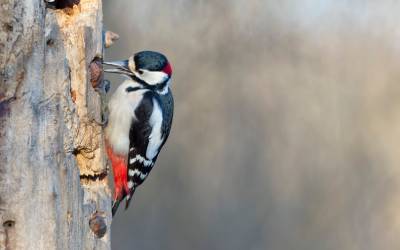Did you know that some of the animals found in Michigan are nature’s own ant control experts? That’s right, though they act as a nuisance to humans, they serve as a valuable food source for a variety of creatures that call this region home. These remarkable animals, ranging from birds to mammals, have developed a taste for ants. By including ants in their diet, these Michigan residents help keep ant populations in check while providing a fascinating example of nature’s delicate balance. Let’s take a look at some ant eating animals in Michigan.
Which Animals Eat Ants in Michigan?
Ants may be annoying to people, but they’re a vital part of the ecosystem. Many animals eat ants, and these common in Michigan animals even rely on ants as an important part of their diet:
- Black Bears – Black bears are omnivorous and have a varied diet that includes insects. They are known to dig through ant hills to consume ants, especially during the spring and summer months when ants are more active. With their insatiable appetites, bears eat a large amount of ants in addition to their other food choices.
- Woodpeckers – While many birds feed on ants, woodpeckers have long, sticky tongues that they use to extract ants from crevices in trees or on the ground. Woodpeckers common eat ants out of infested wood. Unfortunately, woodpeckers can also cause damage to wooden structures that are not just infested with ants and insects. Keep an eye on where they nest and feed if you see them in your yard.
- Raccoons – In Michigan, raccoons are in urban and rural areas. These opportunistic animals eat a wide variety of things, including ants. When foraging, an uncovered ant’s nest is a bountiful feast. Raccoons are often more active during mid-March through mid-May which is when you may see them feasting on ants. Much like woodpeckers, raccoons can also have adverse effects on your property.
- Skunks – Skunks are scavengers, eating whatever they can find. With their strong front claws, they can dig apart ant’s nests and devour the insects inside. They have a keen sense of smell and can scent out ant nests easily through the dirt. During the spring and summer, when ants are highly active, skunks will seek out and eat as much as they can!
Ant Control with Griffin Pest Control
While nature takes care of itself in many cases, professional ant extermination is always the best and proven method. While local wildlife can and will help keep ant populations in check, significant ant infestations in a home or business require a more targeted approach. For effective and long-lasting results, leave it to the experts at Griffin Pest Solutions. Since 1929, Griffin Pest Solutions has been providing Michigan residents with cutting edge pest control innovations. We provide year-round, ongoing solutions to help you and your family live pest-free. Call us today to get started with Griffin and get a free quote!

